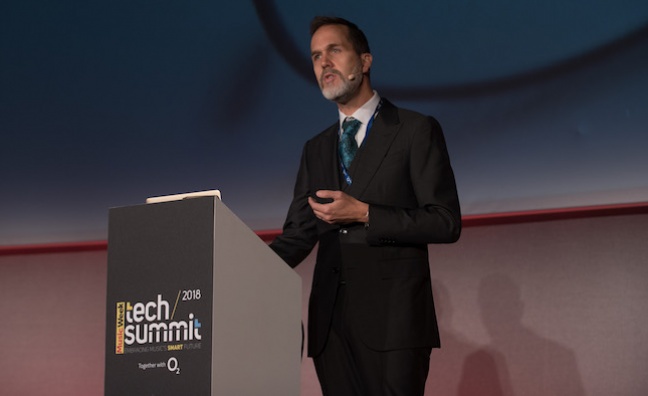A week ago, the BBC’s Joe Harland opened the first ever Music Week Tech Summit with a speech that touched on everything from the power of the audience and the importance of knowing your data, to The Only Way Is Essex Star Gemma Collins and an ancient BBC handbook.
You can catch up on Harland’s speech here, and click here for a full report on an action packed day inside The O2 Arena.
With the applause still audible from the auditorium, Music Week sat down with Harland for a chat about all things music technology, with the aim of finding out what’s making the head of visual and multi-platform radio across BBC Radio 1, 1Xtra, Radio 2, 6 Music and the Asian Network tick.
Scroll down to find out what he’s got up his sleeve for the BBC...
What are you working on at the BBC at the moment?
“It is very rare to find a piece of new technology that emerges and the next day think, ‘I’ve found the perfect use for it’. We’re looking at how our content can work with voice and how we can create great content for that, we’re looking an awful lot at vertical and how we can create compelling vertical video and how we can create compelling vertical visual that then makes people think there’s a great radio journey at the end of that. It isn’t always about saying, ‘Here we’ve got a full filmed performance’. If you filmed something like Simon Mayo’s Confessions, it wouldn’t necessarily be as compelling as the podcast version. What we’re doing most of all is trying to land the innovations as part of an overall content plan for what radio can be. We haven’t changed what radio is, but I think we have, through our innovations, changed what the word means to a young audience. They feel comfortable watching and sharing radio as well as listening to it.”
We have changed what radio means to a young audience
Joe Harland
Radio is such a traditional format, but you’re saying it can still keep up with technology?
“Absolutely. Radio has often innovated. There are very few platforms that are in constant dialogue with the audience, even a TV show doesn’t, during its transmission, look at what the audience are saying and reacting to. I still think that’s one of the great advantages radio has. Great broadcasters like Scott Mills and Greg James see the audience talking about something and then react, play that record or adjust that feature accordingly and make things more compelling as a result.”
And you pay close attention to the rest of the market too…
“We’re also looking at what other people are doing, I don’t think anybody has come up with absolute killer app, and the same with wearables. We were toying with a way of, when listening to our documentaries, there might be a way of every time you look at your wrist you can see what the image is that works with it. Like every industry, you’ve got to have the innovations ready to jump.”
How do you think the rest of the industry views what you do?
“I hope and believe that Radio 1 and the BBC’s role in music is still valued above any other relationship that I am aware of, other than that which exists between the artist and fans. Radio still has the ability to make records and music sound better, more compelling, more thrilling, more moving. Artists want to be on radio and they want to be on our platforms, they value what we can give them."
What’s the hardest part of your job?
“Keeping up with what the audience want.”
Click here to read the best quotes from the Music Week Tech Summit.









